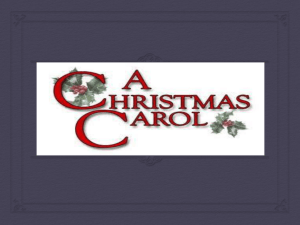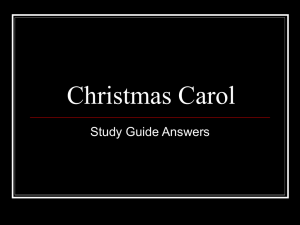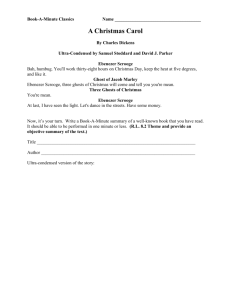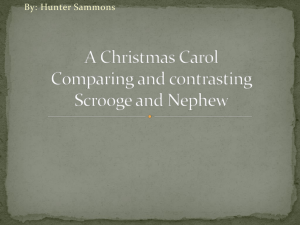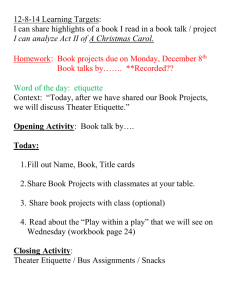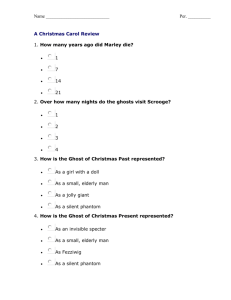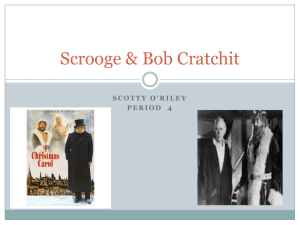A Christmas Carol (from Slideshare)
advertisement
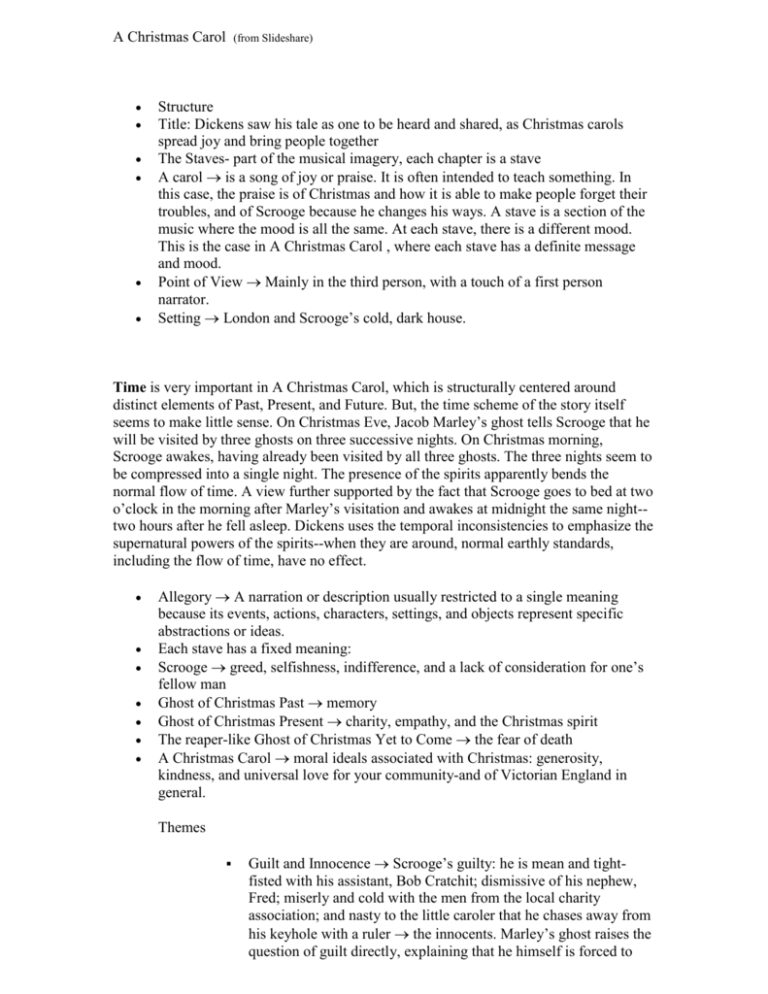
A Christmas Carol (from Slideshare) Structure Title: Dickens saw his tale as one to be heard and shared, as Christmas carols spread joy and bring people together The Staves- part of the musical imagery, each chapter is a stave A carol is a song of joy or praise. It is often intended to teach something. In this case, the praise is of Christmas and how it is able to make people forget their troubles, and of Scrooge because he changes his ways. A stave is a section of the music where the mood is all the same. At each stave, there is a different mood. This is the case in A Christmas Carol , where each stave has a definite message and mood. Point of View Mainly in the third person, with a touch of a first person narrator. Setting London and Scrooge’s cold, dark house. Time is very important in A Christmas Carol, which is structurally centered around distinct elements of Past, Present, and Future. But, the time scheme of the story itself seems to make little sense. On Christmas Eve, Jacob Marley’s ghost tells Scrooge that he will be visited by three ghosts on three successive nights. On Christmas morning, Scrooge awakes, having already been visited by all three ghosts. The three nights seem to be compressed into a single night. The presence of the spirits apparently bends the normal flow of time. A view further supported by the fact that Scrooge goes to bed at two o’clock in the morning after Marley’s visitation and awakes at midnight the same night-two hours after he fell asleep. Dickens uses the temporal inconsistencies to emphasize the supernatural powers of the spirits--when they are around, normal earthly standards, including the flow of time, have no effect. Allegory A narration or description usually restricted to a single meaning because its events, actions, characters, settings, and objects represent specific abstractions or ideas. Each stave has a fixed meaning: Scrooge greed, selfishness, indifference, and a lack of consideration for one’s fellow man Ghost of Christmas Past memory Ghost of Christmas Present charity, empathy, and the Christmas spirit The reaper-like Ghost of Christmas Yet to Come the fear of death A Christmas Carol moral ideals associated with Christmas: generosity, kindness, and universal love for your community-and of Victorian England in general. Themes Guilt and Innocence Scrooge’s guilty: he is mean and tightfisted with his assistant, Bob Cratchit; dismissive of his nephew, Fred; miserly and cold with the men from the local charity association; and nasty to the little caroler that he chases away from his keyhole with a ruler the innocents. Marley’s ghost raises the question of guilt directly, explaining that he himself is forced to o o o o o walk the earth as a ghost because he was a heartless, self-involved man. Redemption Scrooge is redeemed because he learns how to let his spirit walk among his fellow men. He shows this by becoming a better man, and a better master. He shows his redemption slowly by his actions, reactions and emotions. Fear of the world and relationships, fear of death. Wealth and Poverty gap between the rich and poor. Bob Cratchit can barely feed his family, but is happy on Christmas time. A Christmas Carol does not equate poverty with cheer and wealth with misery, however. The party at Fred’s house shows people who are wealthy having a good time Ignorance and Want even though people like the Cratchits can laugh in their poverty, it is still a serious and life-threatening matter. Characters Belle Scrooge’s old girlfriend. Years ago, she broke her relationship off with him because she felt that he had changed for the worse. Bob Cratchit Scrooge’s assistant, a loyal and diligent employee. A child at heart, Cratchit truly enjoys carrying Tiny Tim around town, and is a loving family man. Tim Cratchit Bob Cratchit’s youngest son. Never complains about his handicap. Scrooge does donate money for Tiny Tim’s medical treatment. The Ghost of Christmas Past The first spirit to visit Scrooge is The Ghost of Christmas Past. With him, Scrooge is able to see himself as a younger man and remember a time when he was more open and hopeful about life. The Ghost of Christmas Present The second spirit is loud and boisterous, a large man who shows up with a mountain of food and drink. His purpose is to show Scrooge how his friends and family are celebrating Christmas without him. The Ghost of Christmas Yet to Come This ghost does not speak, but shows Scrooge a bleak future (his death and Tiny Tim’s). Jacob Marley Marley is Scrooge’s late business partner. Dead for seven years, he comes back to haunt Scrooge and warns him that he is wasting his life. He is bound around the waist with a chain, made of cashboxes, keys, padlocks, ledgers, deeds, and heavy purses wrought in steel. He informs Scrooge that he will be visited by three ghosts. Old Fezziwig Fezziwig is Scrooge’s old employer. A large and genial man, he throws a huge Christmas party with food and music and dancing and drinks and good cheer all around. He provides a contrast to the kind of employer Scrooge turns out to be: parsimonious and cold. Ebenezer Scrooge a miser. Learns to treasure humanity through the glimpses that the ghosts of Christmas Past, Present, and Future give him into his own life. He is relieved to find that he still has a chance to change the course of his life, and he does it: he becomes generous and good-humored, a positive force in the community, and good friends with Tiny Tim.
